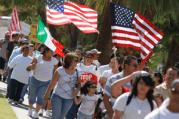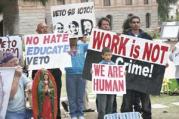Click here if you don’t see subscription options


These remarks were delivered at Fordham University on May 3, 2010 at a lecture sponsored by America and the Fordham Center on Religion and Culture.
On March 21st, I addressed some 250,000 people who were gathered on the Mall in Washington, D.C., for a rally in support of comprehensive immigration reform. In my remarks, I pledged that the Catholic Church would never stop advocating for our immigrant brothers and sisters, and that we would continue to defend their right to be full members of our communities and nation.
That same day, as you may remember, our country’s Congressional legislators were voting on landmark health care reform legislation. It was the culmination of a partisan battle that left both sides bitter and exhausted. And so, in conversation with a few key legislators and their aids the next day, I was disappointed but not altogether surprised to discover that a bi-partisan push for comprehensive immigration reform seemed yet again to be drifting off the legislative agenda and into the fog of uncertainty and inaction.
Thank you, Arizona!
With the stroke of her pen, Arizona Governor Jan Brewer not only signed into law the country's most retrogressive, mean-spirited, and useless anti-immigrant legislation, her action has helped to reinvigorate the comprehensive immigration reform movement, and has made clear the consequences of the failure to fix our nation’s broken immigration system. As President Obama said:
Our failure to act responsibly at the federal level will only open the door to irresponsibility by others. And that includes, for example, the recent efforts in Arizona, which threaten to undermine basic notions of fairness that we cherish as Americans.
One main section of the Arizona law illustrates the disappointment so many of us feel at this time. Article 8, Section 2, Paragraph B of SB 1070 sums it up in its vague and vexing language: “For any lawful contact made by a law enforcement official or agency of this state or a county, city, town or other political subdivision of this state where reasonable suspicion exists that the person is an alien who is unlawfully present in the United States, a reasonable attempt shall be made, when practicable, to determine the immigration status of the persons. The person’s immigration status shall be verified with the federal government pursuant to 8 United States Code section1373(c).” [emphasis added]
The night of Thursday, April 29th, HB 2162 was hurriedly passed in Arizona because of the torrent of opposition generated across the country in regard to SB 1070. The “reasonable suspicion” language remains as just quoted, but the “lawful contact” wording was changed to focus upon secondary enforcement. But the changes could actually result in more people being questioned about their legal status when the police are enforcing any state or local law, or even local ordinances. Does this mean that simple infractions such as overgrown yards, parking on streets, and non-functioning cars in driveways could spark a check on legal status?
The obvious fear is that untold numbers of people will be challenged to prove their legal status in our country—sending further fear and fright across the immigrant community. Neither the Governor nor any major Arizona official is willing to publish a one-page set of criteria to guide law enforcement personnel on what “reasonable suspicion” means in the field.
So, it is with a renewed sense of energy and urgency that I speak with you tonight. I am eager to hear our distinguished respondents, and to engage in dialogue with all of you during the question and answer period. I will begin with a few theological musings that reflect our church’s concern for the immigrant and the stranger. Then I would like to share something of my sense of where things are politically regarding the prospects for comprehensive immigration reform legislation. I will conclude with an invitation for all of us to view our immigrant peoples no longer as strangers or statistics, but to see and hear them as real, flesh-and-blood human beings—neighbors, family members—whose lives are adversely impacted every day that our leaders fail to enact just and fair immigration reform.
Hearing the Stranger
Speaking of hearing and of justice, it is intriguing to note that in the Bible, injustice is often discussed as a serious “hearing problem.”
In the Biblical tradition, injustice is often treated as being related to two kinds of “hearing problems.” The first problem is not only our own inability or even unwillingness to hear the cries of suffering from our own brothers and sisters. That is bad enough.
Just as serious is the second Biblical “hearing problem.” This is the fact that Scripture teaches that God most certainly does hear the cries of suffering. This, too, can be serious for us, because both Biblical “hearing problems” have serious implications for how we think about suffering.
What does Scripture tell us about these “hearing problems”?
The first act of violent injustice was Cain’s murder of his brother Abel. Genesis 4:10 portrays God demanding an explanation from Cain: “And the LORD said, ‘What have you done? Listen; your brother's blood is crying out to me from the ground!’” (Gen 4:10)
In other words, the God of the Bible hears unjust bloodshed. The text suggests that God “hears” the blood of oppression and suffering. So, it is precisely God’s hearing the cries of injustice that led the Israelites to cry to God in their suffering as slaves and alien workers in Egypt: “After a long time the king of Egypt died. The Israelites groaned under their slavery, and cried out. Out of the slavery their cry for help rose up to God” (Exodus 2:23).
The Bible teaches that God’s hearing began the great act of liberation that gives birth to God’s people. Israel is created from this redemption from the oppression of slavery. Pharaoh’s hearing problem had its consequences!
Moses, according to the tradition, warns us that God will certainly hear the prayers of those we might oppress or abuse:


Bishop Gerald Kicanas said the new law “does not address the critical need for border security to confront drug smuggling...and human trafficking.”






